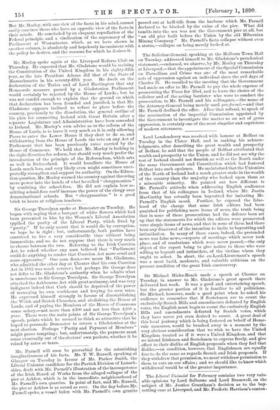Mr. Morley spoke again at the Liverpool Reform Club on
Thursday. He expected that Mr. Gladstone would be revising the Constitution of the United Kingdom in his eighty-fifth year, as the late President Adams did that of the State of Massachusetts in his seventy-fifth year. He dwelt on the declaration of the Tories and of Lord Hartington that any Home-rule measure passed by a Gladstonian Parliament would certainly be rejected by the House of Lords ; but he was not candid enough to explain that the ground on which that declaration has been founded and justified, is that Mr. Gladstone appears inclined to refuse to place before the country, previously to the dissolution, the general outline of his plan for connecting Ireland with Great Britain after a separate Legislature and Administration have been conceded to Ireland. Mr. Morley's own advice as to the reform of the House of Lords, is to leave it very much as it is, only allowing Peers to enter the Lower House if they elect to do so, and withdrawing from the House of Lords the veto on any Act of Parliament that has been previously twice carried by the House of Commons. We hold that Mr. Morley is looking in the right direction for reform, but should very much prefer the introduction of the principle of the Referendum, which acts so well in Switzerland. It would humiliate the House of Lords much less, and very likely even might sometimes unex- pectedly strengthen and support its authority. On the Educa- tion question, Mr. Morley warned the country against throwing more power into the hands of what he called " elergymanism" by remitting the school-fees. He did not explain how re- mitting school-fees could increase the power of the clergy over denominational schools. But " clergymanism " is a good brick to heave at religious teachers.


































 Previous page
Previous page